中考英语倒装句语法知识复习(word版含答案)
中考英语倒装句20(附带答案解析)

中考英语倒装句20(附带答案解析)一、倒装句1.Only in this place ________ such beautiful water and mountains.A. we can findB. can we findC. we foundD. found we【答案】 B【解析】【分析】句意:只有在这个地方我们可以找到如此美丽的水和山。
only+状语(介词短语)位于句首,其后要部分倒装,故把情态动词后助动词放在主语前,情态动词+主语+谓语的语序,故选B。
【点评】考查倒装句,注意only+状语(介词短语)位于句首,其后要部分倒装的用法。
2.— I can't stand (忍受) the air pollution in this city any more. It is getting more terrible.— ________. We've never had so many factories before.A. Neither I can .B. Neither can IC. So I can.D. So can I.【答案】 B【解析】【分析】句意:-我不能在忍受这个城市里的空气污染了,它变得更糟糕了。
-我也不能,我们以前从来没有这么多工厂。
Neither也不,是否定意思,位于句首,应该用倒装,故A不对;C和D应该用于肯定句中,这里是否定句。
故选B。
3.—I've finished my homework, Tony.—_______.A. So have IB. So I haveC. So did ID. So I did【答案】 A【解析】【分析】句意:托尼,我已经完成了我的作业。
——我也是。
So +助动词+主语,表示同样,也;So+主语+助动词,表示的确,确实。
结合句意,表示也做完了,故排除BD 两项。
根据I've 可知此处的助动词是have, 故选A。
九年级英语倒装句X知识点总结及经典习题(含答案)

九年级英语倒装句X知识点总结及经典习题(含答案)一、倒装句1.-- He swam in the river this summer.-- ________A. So did he.B. So she did.C. So did she.【答案】 C【解析】【分析】“so+助动词(情态动词或连系动词)+另一主语”,此句型是主谓倒装结构,可以表示前面的情况也适用于后者,使用该句型需要注意以几个方面的问题:1.该句型只能用于肯定句,不能用于否定句:如果前句是否定句,则要用“neither /nor +助动词+主语”。
2.句型中的主语与上文中的主语是不同的两个主语3.句型中助动词,包括连系动词和情态动词的时态要和上句中谓语动词的时态相一致。
句意:这个夏天,他在这条河中游泳了。
她也游泳了。
结合语境可知前文情况也适用于后者,故用主谓倒装结构,选C。
【点评】这几个倒装句的区别比较难。
“so+助动词(情态动词或连系动词)+另一主语”,表示前面的情况也适用于后者。
So+主语+助动词(情态动词或连系动词)是对上文所说的情况加以肯定。
如果上文是否定形式则要将so换成neither。
2.— I think the plan is just a waste of time. What do you think?— Well, if you don't support the plan, ________.A. neither do IB. so do IC. neither will ID. so will I【答案】 C【解析】【分析】句意:——我认为这个计划只是在浪费时间。
您是怎么想的?——好,如果你不支持这个计划,我也不支持。
Neither+助动词+主语,表示主语也不是……;这里是if引导的条件状语从句,主句用一般将来时,从句用一般现在时态,这里是主句,故助动词用will。
根据题意,故选C。
【点评】考查倒装句,注意Neither+助动词+主语,表示主语也不是这样;so+助动词+主语,表示主语也是这样。
人教版中考英语九年级英语 倒装句考点解析(Word版附答案)

人教版中考英语九年级英语倒装句考点解析(Word版附答案)一、倒装句1.请从下列每题的四个选项(A、B, C,和D)中,选出一个意思相同或相近的选项替换句中的划线部分。
—I have never been to Hong Kong. —Me, neither.A. So have IB. So I doC. Neither do ID. Neither have I【答案】 D【解析】【分析】句意:一一我没有去过香港。
我也没有。
A. So have I我也过; B. So I do 我确实做;C. Neither do I 我也不做;D. Neither have I我也没有去过。
Me, neither我也没有去过。
与neither引出的倒装句含义相当,原句用的是现在完成时态,故选D。
2.—Zhou Ming likes reading English magazines.—_______. It's good for English learning.A. So do IB. So am IC. So I do【答案】 A【解析】【分析】句意为:—周明喜欢读英语杂志。
—我也是。
这对英语学习由好处。
So+助动词+主语,完全倒装,表示“.......也......”。
故选A。
【点评】考查倒装句3.—He was late for the meeting.—___________A. So I wasB. So was IC. So I didD. So did I【答案】 B【解析】【分析】句意:--他开会迟到了。
--我也一样。
So+助动词/be动词/情态动词+主语属于倒装句肯定形式,表示说话人的行为、动作和前面提到的人的行为、动作相同.意为:也;So+主语+助动词是对一件事的内容加以证实或肯定.意为"的确如此"。
be late for...做...迟到了,有be 动词,故选B。
中考英语倒装句练习题及答案含解析

中考英语倒装句练习题及答案含解析一、倒装句1.——My brother and I will go to the library tomorrow.—— ___. Shall we go together?A. So I doB. So do IC. So will ID. So I will【答案】 C【解析】【分析】句意:---明天我弟弟和我将要去图书馆。
---我也要去。
我们能一起去吗?表示某某人也一样,用So+be/助动词/情态动词+主语。
明天要去,应用情态动词will。
故选C。
【点评】考查倒装句的用法。
2.— I can't stand (忍受) the air pollution in this city any more. It is getting more terrible.— ________. We've never had so many factories before.A. Neither I can .B. Neither can IC. So I can.D. So can I.【答案】 B【解析】【分析】句意:-我不能在忍受这个城市里的空气污染了,它变得更糟糕了。
-我也不能,我们以前从来没有这么多工厂。
Neither也不,是否定意思,位于句首,应该用倒装,故A不对;C和D应该用于肯定句中,这里是否定句。
故选B。
3.— I think the plan is just a waste of time. What do you think?— Well, if you don't support the plan, ________.A. neither do IB. so do IC. neither will ID. so will I【答案】 C【解析】【分析】句意:——我认为这个计划只是在浪费时间。
您是怎么想的?——好,如果你不支持这个计划,我也不支持。
初三英语倒装句练习题50题答案解析版

初三英语倒装句练习题50题答案解析版1. In the middle of the room ____ a large table.A. standsB. standC. standingD. stood答案:A。
解析:完全倒装句的结构是“表语/状语+谓语+主语”。
此句中“in the middle of the room”是地点状语位于句首,句子要用完全倒装。
主语是“a large table”为单数,根据句子时态一般现在时,所以谓语动词用第三人称单数形式stands。
B选项stand用于主语是复数的情况;C选项standing不是谓语形式;D选项stood是一般过去时,不符合句子时态。
2. There ____ a lot of people at the concert last night.A. wasB. wereC. isD. are答案:B。
解析:在“there be”句型中,当表示某地有某物或某人时,be动词的形式取决于后面的主语。
这里“a lot of people”是复数,句子时态是一般过去时,所以要用were。
A选项was用于单数主语;C选项is是一般现在时的单数形式;D选项are是一般现在时的复数形式。
3. Out ____, with a stick in his hand.A. did he rushB. rushed heC. he rushedD. he did rush答案:C。
解析:当表示方位的副词out位于句首时,如果主语是代词,句子不用完全倒装,而是采用正常语序。
这里主语是he,所以是he rushed。
A选项did he rush是部分倒装形式;B选项rushed he 是完全倒装形式,但不适用于主语是代词的情况;D选项he did rush 这种形式不符合正常用法。
4. ____ from the mountain, the city looks very beautiful.A. SeeB. SeenC. SeeingD. To see答案:B。
中考英语倒装句练习题(附答案)

典型例题: (1) Not until the early years of the 19th century___ what heat is. A. man did know B. man knew C. didn‘t man know D. did man know 答案为D. 否定词Not在句首,要求用部分倒装的句子结构。
注意:只有当Not only… but also连接两个分句时,才在第一个分句用倒装结构。如果置于句首的Not only… but also仅连接两个并列词语,不可用倒装结构。
01
Not only you but also I am fond of music.
01
so, neither, nor作部分倒装。
Not until the early years of the 19th century ___ what heat is.
答案D。看到Not until…的句型,我们知道为一倒装句,答案在C,D 中选一个。
A. man did know B. man know C. didn‘t man know D. did man know
01
Try hard as he will, he never seems able to do the work satisfactorily.
02
注意:
注意:
01
让步状语从句中,有though,although时,后面的主句不能有but,但是 though 和yet可连用。
02
其他部分倒装。
Not until I began to work ___ how much time I had wasted.
didn‘t I realize
(人教版)中考英语总复习语法:专题11-主谓一致和倒装句(96页)

The writer and scientist has come. 这位作家兼科学家已经来了。
5.主语后跟with,along with,together with, except,but,like,as well as,rather than,more than,besides,including等引起的短语,谓语动词的 数由前面主语的单复数来决定,不受短语的影响。 Mr.Brown,together with his children, has come to China.布朗先生和他的孩子们一起来到了中国。
3.把副词so放在句首,表示前面所说的情况也适 用于另一个人(或物),构成“so+be动词/助动词/情态 动词+主语”结构时,用部分倒装。 Your sister is a nurse,so is my sister. 你姐姐是护士,我姐姐也是护士。 注:当后者对前者所说的内容表示赞同或加以例 证、强调时,用结构“so+主语+be动词/助动词/情态 动词”表示,意为“„„的确如此”。
注:what引导的主语从句,后面的谓语动词多数 情况下用单数形式,但如果表语是复数或 what从句是 一个带有复数意义的并列结构时,主句的谓语动词可 以用复数形式。
4.由连词and或both...and连接两个名词或代词作 主语时,谓语动词通常用复数形式。 Mike and Jack are good students.迈克和杰克是好 学生。 注:如果and所连接的两个词是指同一个人或物 时,后面的谓语动词就应用单数形式。由and连接的并 列单数主语前如果分别有no,each,every,more than a/an,many a/an修饰时,其谓语动词要用单数形 式。
6.当主语是一本书或一条格言时,谓语动词常用 单数。 Harry Potter is an interesting book. 《哈里· 波特》是一本有趣的书。
(完整版)倒装句全面讲解和练习(答案)

(完整版)倒装句全面讲解和练习(答案)初中英语倒装句(一)倒装句的意义1、适应一定的语法结构的需要,主要是指疑问句句型结构的需要。
E.g. Was the People’s Liberation Army founded in 1927?2、为了强调某一部分,而把这部分放到句首,构成倒装。
e.g. Never have I been late for school this term.(二)倒装的使用情况一、部分倒装:就是把谓语中的be动词、助动词或情态动词置于主语前面。
常见于下列几种情况:(一). only所修饰的副词,介词短语或状语从句放在句首时,要用:only+ 状语+ be /助动词/情态动词+主语及其他例如:Only when he told me the news did I know what had happened.注意:only修饰主语时,不需要倒装。
例如:Among all the people, only you know the truth.小试牛刀:Only in this way ________to make improvement in the operating system.A. you can hopeB. you did hopeC. can you hopeD. did you hope(二).含有否定意义的副词或连词放在句首时。
如:never, little, seldom, not, not only, not until, no sooner (…than), hardly (…when), rarely, scarcely, in no way等。
例如:We seldom get up at four in the morning.= Seldom do we get up at four in the morning.Not a single word from him could express his feelings.(1) hardly…when; scarcely…when…; no sooner…than… 可以用正常语序had hardly done when… did 或用倒装句式Hardly had +主语+ done when… did 句式。
中考英语语法之倒装句用法详解及练习分析
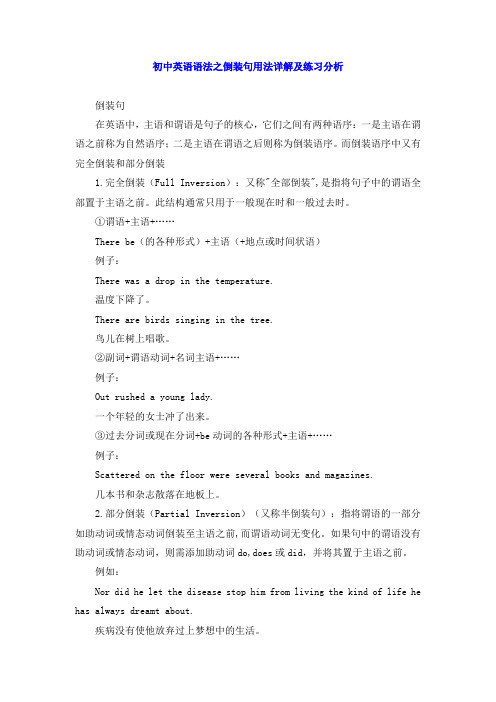
初中英语语法之倒装句用法详解及练习分析倒装句在英语中,主语和谓语是句子的核心,它们之间有两种语序:一是主语在谓语之前称为自然语序;二是主语在谓语之后则称为倒装语序。
而倒装语序中又有完全倒装和部分倒装1.完全倒装(Full Inversion):又称"全部倒装",是指将句子中的谓语全部置于主语之前。
此结构通常只用于一般现在时和一般过去时。
①谓语+主语+……There be(的各种形式)+主语(+地点或时间状语)例子:There was a drop in the temperature.温度下降了。
There are birds singing in the tree.鸟儿在树上唱歌。
②副词+谓语动词+名词主语+……例子:Out rushed a young lady.一个年轻的女士冲了出来。
③过去分词或现在分词+be动词的各种形式+主语+……例子:Scattered on the floor were several books and magazines.几本书和杂志散落在地板上。
2.部分倒装(Partial Inversion)(又称半倒装句):指将谓语的一部分如助动词或情态动词倒装至主语之前,而谓语动词无变化。
如果句中的谓语没有助动词或情态动词,则需添加助动词do,does或did,并将其置于主语之前。
例如:Nor did he let the disease stop him from living the kind of life he has always dreamt about.疾病没有使他放弃过上梦想中的生活。
部分倒装也有以下几种常见类型:1. 以否定词开头的句子要求部分倒装。
注意下列句子中助动词或情态动词提前、甚至补充助动词的用法:例:Not until yesterday did little John change his mind.小约翰直到昨天才改变了主意。
中考英语句子之倒装句(含答案)专项练习

中考英语 -句子之倒装句(含答案)-专项练习一、单项选择题1. — My brother and I will go to the library tomorrow.— . Shall we go together?A. So do IB. So I doC. So willI D. So I will2.He doesn't like doing any housework and ______ do I.A. eitherB. noC. notD. neither3. — I have never visited a paper factory.—.A. So have IB. I haven't nowC. Neither have I4. — Della likes dancing, but doesn't like swimming.— ____________.A. So does MaryB. Neither does MaryC. So it is With MaryD. Nor does Mary5. — Peter doesn't know many people here.—______A. So do IB. So am IC. Neither amI D. Neither do I6. — I didn't go to Tom's birthday party yesterday. What about you?— ________, because I was preparing for the exam all the time. A. Neither was I B. Neither am I C. Neither didI D. Neither do I7.--Peter knows many people here.---_________________A. So do IB. So am IC. Neither amI D. Neither do I8. — All the students are working hard now.— _______. Because all of them want to go to good colleges.A. So are theyB. Neither they areC. So they areD. So they do9. — I was a volunteer for the 2019 Olympic games.— ______. What a great experience we had!A. So I amB. So I wasC. So wasI D. So am I10. — Oh, my god! Recently I have put on 5 pounds.—. I think I should lose weight.A. So do IB. So have IC. Neither doI D. Neither have I11. — I'm waiting for the visitors very anxiously.— Look, here ______ these visitors.A. comeB. comesC. goD. goes12. —— Will your younger brother go for a picnic this Sunday?——If I don't go, ________ .A. so does heB. so will heC. neither doeshe D. Neither will he13.—We are not allowed to bring any snacks or drinks at the school meeting.—.A. Neither are weB. Neither do weC. So are weD. So do we14. — Peter, I will visit our teacher this Sunday.—_______. Let's go together.A. Nor do IB. I will doC. So willI D. So can I15. — Zhou Ming likes reading English magazines.—_______. It's good for English learning.A. So do IB. So am IC. So I do16. — I am not going swimming tomorrow afternoon.—_____. I have to clean up my bedroom.A. So am IB. Neither am IC. Neither I17. — I'm not allowed to go out on school nights.—________..A. So am IB. Neither am IC. So Ido D. Will be18. — Tara has made great progress in English this term.—_______, and ________.A. So she has; so have youB. So she has; so you haveC. So has she;so you haveD. So has she; so have you19. —— I am not going to the amusement park.——.A. So do IB. So am IC. Neither doI D. Neither am I20. — I'm not going swimming this afternoon.—______. I have to help my mother do some cleaning.A. So am IB. So I amC. Neither amI D. Neither I am21. — I've finished my homework, Tony.—_______.A. So have IB. So I haveC. So did22. —— My brother and I will go to the library tomorrow.—— ___. Shall we go together?A. So I doB. So do IC. So willI D. So I will23.---I hear Huang Gang made an English speech at his graduation ceremony yesterday.--- ________, and ________.A. So he did, so did IB. So did he, so I didC. So he was, so was ID. So was he, so I was24.Jim, here _________ some letters for you.A. isB. areC. haveD. Has25.A: I don't know how to use the software (软件 ).B:.A. So do IB. So am IC. Neither doI D. Neither am I26. — My brother and I will go to the library tomorrow.— ______. Shall we go together?A. So am IB. So do IC. So Iam D. So will I27. — I haven't seen the interesting movie Let the Bullet(子弹)Fly.—_________.A. Neither have IB. So have IC. Neither I haveD. So I have28. — I like geography very much.—. It's my favorite subject in school.A. So am IB. So do IC. Neither do I29.-I don't know about you, but I'm sick and tired of this weather.-_______. I can't stand all this rain.A. I don't careB. It's hard to sayC. So amI D. I hope not30. – My sister has never visited Eiffel Tower. How about you?–__________.A. So have IB. So did IC. Neither Ihave D. Neither have I31. — Will you please go to Mr Zhang's birthday party tomorrow?—_________ if you do.A. So do IB. So will IC. So I doD. So I will32. — I think the plan is just a waste of time. What do you think?—Well, if you don't support the plan, ________.A. neither do IB. so do IC. neither willI D. so will I33. — They didn't go to the park yesterday.— ________.A. So did weB. So we didC. Neither didwe D. Neither we did34. — I haven't been to a water park.—.A. So have IB. So has IC. Neither haveI D. Neither has I35. – Will Tony go for the picnic at the weekend?– If I don't go, ______.A. so does heB. neither will heC. neither he does36.一 I didn't watch the football match on TV yesterday.一. I got home too late to watch it.A. So did IB. Neither did IC. So Idid D. Neither I did37.Jack can't play the piano. _______.A. So can IB. So I canC. Neither canI D. Neither I can38. — Listen!.—Oh,let's go to the classroomA. There goes the bellB. There's the bellC. There the bellgoes D. The bell goes there39. — Jim went swimming with his parents yesterday afternoon.—_________.A. So Mary didB. So Mary doesC. So Marywas D. So did Mary40. — My mother hardly watches any sports shows.— ______.A. So do IB. So does mineC. Neither doI D. Neither does mine答案分析部分一、单项选择题1. — My brother and I will go to the library tomorrow.— . Shall we go together?A. So do IB. So I doC. So willI D. So I will【答案】 C【考点】倒装句【分析】【剖析】“so+助动词(神态动词或连系动词)+另一主语”,此句型是主谓倒装构造,能够表示前方的状况也合用于后者,使用该句型需要注意以几个方面的: 1.句型只好用于必定句,不可以用于否认句:假如前句能否认句,要用“neither/nor +助+主”。
初三英语倒装句练习题50题含答案解析
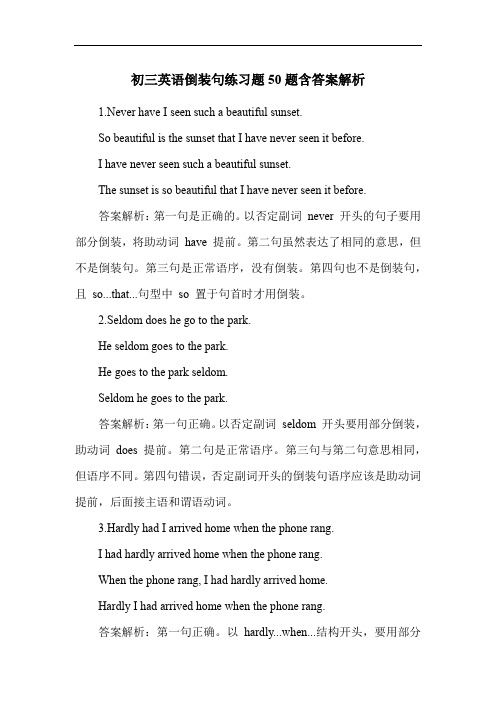
初三英语倒装句练习题50题含答案解析1.Never have I seen such a beautiful sunset.So beautiful is the sunset that I have never seen it before.I have never seen such a beautiful sunset.The sunset is so beautiful that I have never seen it before.答案解析:第一句是正确的。
以否定副词never 开头的句子要用部分倒装,将助动词have 提前。
第二句虽然表达了相同的意思,但不是倒装句。
第三句是正常语序,没有倒装。
第四句也不是倒装句,且so...that...句型中so 置于句首时才用倒装。
2.Seldom does he go to the park.He seldom goes to the park.He goes to the park seldom.Seldom he goes to the park.答案解析:第一句正确。
以否定副词seldom 开头要用部分倒装,助动词does 提前。
第二句是正常语序。
第三句与第二句意思相同,但语序不同。
第四句错误,否定副词开头的倒装句语序应该是助动词提前,后面接主语和谓语动词。
3.Hardly had I arrived home when the phone rang.I had hardly arrived home when the phone rang.When the phone rang, I had hardly arrived home.Hardly I had arrived home when the phone rang.答案解析:第一句正确。
以hardly...when...结构开头,要用部分倒装,将助动词had 提前。
第二句是正常语序。
初中英语2023中考语法知识讲解(倒装句+强调句)
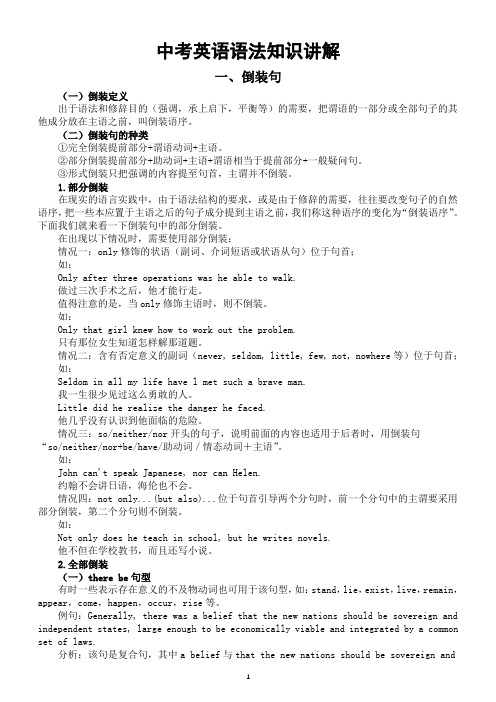
中考英语语法知识讲解一、倒装句(一)倒装定义出于语法和修辞目的(强调,承上启下,平衡等)的需要,把谓语的一部分或全部句子的其他成分放在主语之前,叫倒装语序。
(二)倒装句的种类①完全倒装提前部分+谓语动词+主语。
②部分倒装提前部分+助动词+主语+谓语相当于提前部分+一般疑问句。
③形式倒装只把强调的内容提至句首,主谓并不倒装。
1.部分倒装在现实的语言实践中,由于语法结构的要求,或是由于修辞的需要,往往要改变句子的自然语序,把一些本应置于主语之后的句子成分提到主语之前,我们称这种语序的变化为“倒装语序”。
下面我们就来看一下倒装句中的部分倒装。
在出现以下情况时,需要使用部分倒装:情况一:only修饰的状语(副词、介词短语或状语从句)位于句首;如:Only after three operations was he able to walk.做过三次手术之后,他才能行走。
值得注意的是,当only修饰主语时,则不倒装。
如:Only that girl knew how to work out the problem.只有那位女生知道怎样解那道题。
情况二:含有否定意义的副词(never, seldom, little, few, not, nowhere等)位于句首;如:Seldom in all my life have l met such a brave man.我一生很少见过这么勇敢的人。
Little did he realize the danger he faced.他几乎没有认识到他面临的危险。
情况三:so/neither/nor开头的句子,说明前面的内容也适用于后者时,用倒装句“so/neither/nor+be/have/助动词/情态动词+主语”。
如:John can't speak Japanese, nor can Helen.约翰不会讲日语,海伦也不会。
情况四:not only...(but also)...位于句首引导两个分句时,前一个分句中的主谓要采用部分倒装,第二个分句则不倒装。
初三英语倒装句试题答案及解析

初三英语倒装句试题答案及解析1.—If you don’t go there,.A.so do I B.so will IC.neither do I D.neither will I【答案】D【解析】句意:如果你不去那,我也不去。
if引导的条件状语从句,主将从现,if引动的从句用一般现在时,所以空缺的主句应该用一般将来时。
而will是将要,表将来。
So+情态动词/助动词/be情态动词/助动词/be动词+主语,表示….也不是。
故选D。
动词+主语。
表示…也是。
Neither+【考点】考查倒装句。
2. If you want to go to the mountains this evening, so ______ I.A. doB. willC. am【答案】B【解析】句意:如果你今天晚上想去山上,我也去. so, neither位于分句或句子的开头,这种结构通常表示前面所说的情况也适合于另一个人(或事物),表示“我也这样”之类的概念。
其句型可归纳为: so / neither + be / have / 助动词 / 情态动词 + 主语。
so, neither开头的倒装句一定要与上句的时态保持一致。
so, neither开头的倒装句中的助动词或情态动词要根据人称的变化而变换。
所以选B。
【考点】考查倒装句。
3. -Jack went to see the man who was in hospital yesterday. -_A.So did he B.So he didC.He did so D.Did so he【答案】B【解析】句意:-Jack昨天去看医院里的那个人了。
-的确是这样。
根据句意可知,这里两个人谈论的都是Jack,主语没有发生变化,因此不用so的倒装结构。
根据句意可知,Jack是昨天去医院的,故选B,这个选项的意思是来肯定前面的人所说的话。
【考点】考查so的用法。
4.Mr. Smith’s never angry with their daughter. __________ Mrs. Smith.A.So is B.So hasC.Neither is D.Neither has【答案】C【解析】句意: 史密斯先生从来不生他们女儿的气。
人教版中考英语九年级英语倒装句试题和答案

人教版中考英语九年级英语倒装句试题和答案一、倒装句1.– Will Tony go for the picnic at the weekend?– If I don't go, ______.A. so does heB. neither will heC. neither he does【答案】 B【解析】【分析】neither+主语+谓语,表示对前句所说内容的肯定,neither+谓语+主语,表示前句所说情况也适用于后者,句意:Tony周末去野餐吗?如果我不去,他也不去。
前句情况也适用于后者,所以用倒装,故选B。
【点评】考查倒装句的用法。
2.—He's never been late for school.—________________.A. So have IB. So am IC. Neither have ID. Nor am I【答案】 C【解析】【分析】句意:—他从来没有上学迟到过。
—我也没有。
So+助动词+主语,表示主语也是;neither+助动词+主语,表示主语也不是这样;根据上文是现在完成时,这里用助动词have。
根据题意,故选C。
【点评】考查固定句型neither+谓+主。
3.— Can you come to my birthday party, Lily?— If Jack does, ____________.A. so do IB. so I doC. so will I【答案】C【解析】【分析】句意:-Lily,你能来参加我的生日晚会吗?-如果Jack去,我就会去。
so do I我也是;so I do.我的确如此;so will I.我也将会。
句中if引导的是条件状语从句,从句中用一般现在时态,主句用一般将来时态,倒装结构表示上面说的情况也适用于另外一人,即我也会去参加。
故应选C。
【点评】考查倒装句。
4.—I didn't go to the cinema yesterday. What about you?—____________, because I was preparing for the project all the time.A. Nor do IB. Neither did IC. Neither am ID. Nor was I【答案】 B【解析】【分析】句意:—我昨天没有去电影院,你的?—我也没去,因为我一直在准备这个项目。
中考英语倒装句解题技巧讲解及练习题(含答案)

中考英语倒装句解题技巧讲解及练习题(含答案)一、倒装句1.–I usually go hiking with my friends.-- ____do I.A. NorB. SoC. Neither【答案】 B【解析】【分析】句意:一一我经常和朋发一起去徒步旅行。
一一我也是。
肯定句后跟”so+谓语+主语“,表示某人某物也……;否定句后跟"Neither/Nor+谓语+主语”,表示某人某物也不……。
本题前句是肯定句,故选B。
2.—Zhou Ming likes reading English magazines.—_______. It's good for English learning.A. So do IB. So am IC. So I do【答案】 A【解析】【分析】句意为:—周明喜欢读英语杂志。
—我也是。
这对英语学习由好处。
So+助动词+主语,完全倒装,表示“.......也......”。
故选A。
【点评】考查倒装句3.—More and more people prefer to walk rather than ride in cars.—________. Walking is good for health.A. So they areB. So are theyC. So they doD. So do they【答案】 C【解析】【分析】句意:——越来越多的人比起开车更喜欢走路。
——确实如此,走路对健康有好处。
A他们也是,B是啊,C是啊,D他们也是。
根据 Walking is good for health,可知表示确实是这样,起强调作用,用so+主语+助动词,因此排除B和D;再根据谓语prefer,实义动词,和主语people可知,应用助动词do,故选C。
【点评】考查倒装句,注意理解倒装句so do they和陈述句so they do的意义及用法区别。
2020中考英语复习--倒装句专项讲解和练习题(附答案)
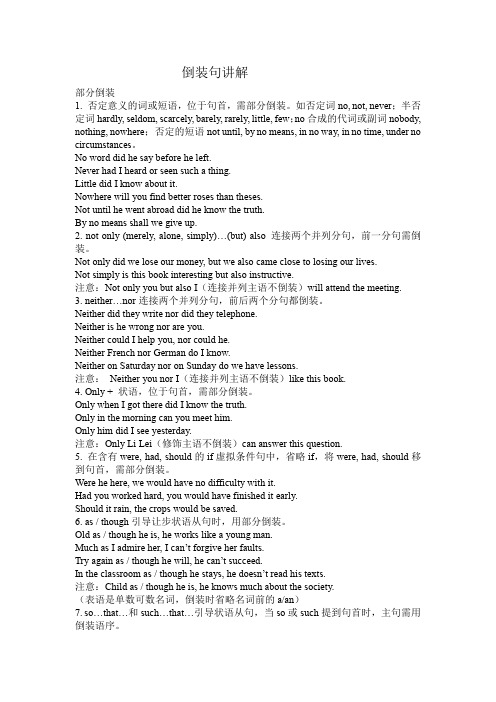
倒装句讲解部分倒装1. 否定意义的词或短语,位于句首,需部分倒装。
如否定词no, not, never;半否定词hardly, seldom, scarcely, barely, rarely, little, few;no合成的代词或副词nobody, nothing, nowhere;否定的短语not until, by no means, in no way, in no time, under no circumstances。
No word did he say before he left.Never had I heard or seen such a thing.Little did I know about it.Nowhere will you find better roses than theses.Not until he went abroad did he know the truth.By no means shall we give up.2. not only (merely, alone, simply)…(but) also 连接两个并列分句,前一分句需倒装。
Not only did we lose our money, but we also came close to losing our lives.Not simply is this book interesting but also instructive.注意:Not only you but also I(连接并列主语不倒装)will attend the meeting.3. neither…nor连接两个并列分句,前后两个分句都倒装。
Neither did they write nor did they telephone.Neither is he wrong nor are you.Neither could I help you, nor could he.Neither French nor German do I know.Neither on Saturday nor on Sunday do we have lessons.注意:Neither you nor I(连接并列主语不倒装)like this book.4. Only + 状语,位于句首,需部分倒装。
中考英语倒装句专题练习及答案

中考英语:倒装句专题第一部分:1-50 专项练习第二部分:51-100全面解析1.—We are not allowed to bring any snacks or drinks at the school meeting.— .A.Neither are we B.Neither do weC.So are we D.So do we2.—I didn't go to the cinema yesterday. What about you?—____________, because I was preparing for the project all the time.A.Nor do I B.Neither did I C.Neither am I D.Nor was I 3.—I didn't go to Tom's birthday party yesterday. What about you?—________, because I was preparing for the exam all the time.A.Neither was I B.Neither am I C.Neither did I D.Neither do I 4.— Can you come to my birthday party, Lily?— If Jack does, ____________.A.so do I B.so I do C.so will I 5.—Many students won 't take part in the after-school activities today.— .We have so much homework to do!A.So will I B.So do IC.Neither will I D.Neither do I6.— My mother hardly watches any sports shows.—_________A.So do mine.B.So does mine.C.Neither do mine.D.Neither does mine.7.—I don't understand the story in the new unit. What about you, Bill?—_____.A.Neither I do B.Neither do I C.So do I D.So I do 8.—Oh,my god!Recently I have put on 5 pounds.— . I think I should lose weight.A.So do I B.So have IC.Neither do I D.Neither have I9.—He's never been late for school.—________________.A.So have I B.So am IC.Neither have I D.Nor am I10.— I think the plan is just a waste of time. What do you think?— Well, if you don't support the plan, ________.A.neither do I B.so do IC.neither will I D.so will I11.— I can't stand (忍受) the air pollution in this city any more. It is getting more terrible.— ________. We've never had so many factories before.A.Neither I can .B.Neither can IC.So I can.D.So can I.12.—I couldn't work out the math problem.—________. I found ________ difficult for us to do it.A.So could I; this B.Neither could I; itC.So can I; that D.Neither I could; it13.She has to get up early every morning and ________.A.so have I B.so do I C.I do so D.I have so 14.—I haven't been to a water park.— .A.So have IB.So has IC.Neither have ID.Neither has I15.-- I hear Huang Gang made an English speech at the graduation ceremony yesterday.-- ________ and ________.A.So he did, so did I B.So did he, so I didC.So he was, so was I D.So was he, so I was16.— I'm not allowed to go out on school nights.— ________..A.So am I B.Neither am I C.So I do D.Will be 17.— I was a volunteer for the 2008 Olympic games.— ______. What a great experience we had!A.So I am B.So I was C.So was I D.So am I18.His father likes going hiking. _______.A.So does his mother B.So is his motherC.So his mother is D.So his mother does19.His father likes going hiking. _______.A.So does his mother B.So is his motherC.So his mother is D.So his mother does20.——Lucy can't go mountain climbing with us tomorrow.——_________ I have to do housework at home.A.So can I. B.Neither can I. C.Neither I can.21.-- I can't hang out with you because of illness.-- If you don't go, .A.neither will IB.so do IC.neither do I22.一I like the smell in the air-newly-cut grass and sweet flowers.一. It smells so nice.A.So I do B.So do IC.So am I D.So I am23.—What language is that guy speaking? I can hardly catch a single word!— . He's from India, so I guess it is Hindi.A.Neither I can B.Neither can IC.So I can D.So can I24.—Oh,my god!Recently I have put on 5 pounds.—. I think I should lose weight.A.So do I B.So have IC.Neither do I D.Neither have I25.请从下列每题的四个选项(A、B, C,和D)中,选出一个意思相同或相近的选项替换划线部分。
英语语法归纳总结及倒装句(附答案)
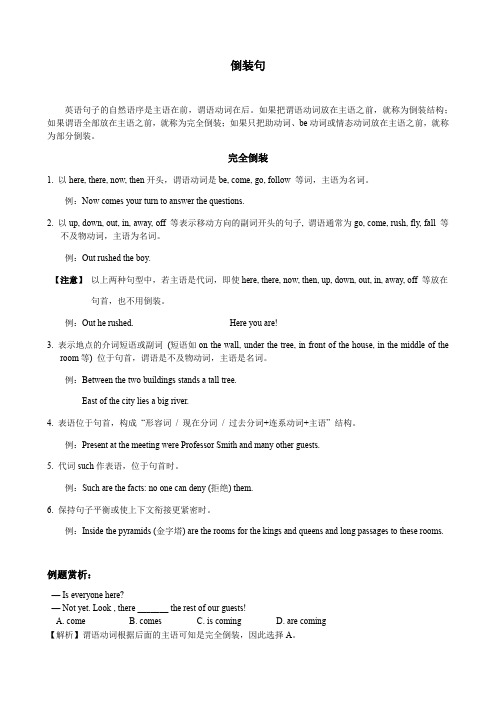
倒装句英语句子的自然语序是主语在前,谓语动词在后。
如果把谓语动词放在主语之前,就称为倒装结构;如果谓语全部放在主语之前,就称为完全倒装;如果只把助动词、be动词或情态动词放在主语之前,就称为部分倒装。
完全倒装1. 以here, there, now, then开头,谓语动词是be, come, go, follow 等词,主语为名词。
例:Now comes your turn to answer the questions.2. 以up, down, out, in, away, off 等表示移动方向的副词开头的句子, 谓语通常为go, come, rush, fly, fall 等不及物动词,主语为名词。
例:Out rushed the boy.【注意】以上两种句型中,若主语是代词,即使here, there, now, then, up, down, out, in, away, off 等放在句首,也不用倒装。
例:Out he rushed. Here you are!3. 表示地点的介词短语或副词(短语如on the wall, under the tree, in front of the house, in the middle of theroom等) 位于句首,谓语是不及物动词,主语是名词。
例:Between the two buildings stands a tall tree.East of the city lies a big river.4. 表语位于句首,构成“形容词/ 现在分词/ 过去分词+连系动词+主语” 结构。
例:Present at the meeting were Professor Smith and many other guests.5. 代词such作表语,位于句首时。
例:Such are the facts: no one can deny (拒绝) them.6. 保持句子平衡或使上下文衔接更紧密时。
中考英语倒装句练习题40题答案解析版

中考英语倒装句练习题40题答案解析版1. Only when he reached the tea - house ______ it was the same place he'd been in last year.A. he realizedB. realized heC. did he realizeD. he did realize答案:C解析:本题考查部分倒装。
only + 状语从句放在句首时,主句要用部分倒装,即将助动词、be动词或情态动词提到主语之前。
原句正常语序为He realized it was the same place he'd been in last year only when he reached the tea - house。
A和D选项是正常语序,不符合要求。
B选项形式错误。
C选项did提到主语he之前,是正确的部分倒装形式。
2. Not until all the fish died in the river ______ how serious the pollution was.A. did the villagers realizeB. the villagers realizedC. the villagers did realizeD. didn't the villagers realize答案:A解析:not until位于句首时,句子要部分倒装。
其正常语序为Thevillagers didn't realize how serious the pollution was until all the fish died in the river。
B和C选项是正常语序。
D选项中多了一个否定词not,不符合题意。
A选项将助动词did提到主语the villagers之前,是正确的部分倒装形式。
3. - I don't like reading newspapers. - ______.A. So do IB. Neither do IC. So I doD. Neither I do答案:B解析:本题考查部分倒装。
【中考英语复习之语法】课时07 特殊句(1倒装句 2祈使句 3感叹句 4附加疑问句)(学生及答案)

第七课时.特殊句(1.倒装句 2.祈使句 3.感叹句 4.附加疑问句)一、完全倒装完全倒装是指将句子中的谓语动词全部置于主语之前。
此结构通常只用于一般现在时或一般过去时。
部分倒装是指将谓语的一部分,如助动词或情态动词,置于主语之前。
如果句中的谓语部分不含有助动词或情态动词时,则需添加助动词do, does或did,并将其置于主语之前。
一、祈使句①It could be anything—gardening, cooking, music, sports—but whatever it is, (make) sure it’s a relief from daily stress rather than another thing to worry about.①Will you please read it again more slowly?(改为祈使句)→ again more slowly, please.①If you don’t listen to me, I’ll go.(改为同义句)→ ,__or I’ll go.5.Simon, (推)hard when I tell you to.6.everyone with politeness even those who are very rude to you, not because they are nice, but because you are.A.TreatB.TreatingC.TreatedD.To treat二、附加疑问句“陈述句+反意问句”构成,基本原则是“前否后肯,前肯后否”。
附加疑问句由题组训练根据汉语提示完成句子①My sister is too young to go to school,she? 我妹妹太小了不能去上学,是吗?①Everything is ready,isn’t ?一切都准备好了,是吗?①Those aren’t apple trees,are ?那些不是苹果树,是吗?①You had better stay at home,you? 你最好待在家里,是吗?①We needn’t do it now,we?我们不必现在就做这件事,是吗?①Don’t play with guns,you?不要玩枪,好吗?①We don’t think she is wrong,she? 我们认为她没错,是吗?①—You don’t like the man,do you?—,I don’t.——你不喜欢这个男人,是吗?——是的,我不喜欢。
- 1、下载文档前请自行甄别文档内容的完整性,平台不提供额外的编辑、内容补充、找答案等附加服务。
- 2、"仅部分预览"的文档,不可在线预览部分如存在完整性等问题,可反馈申请退款(可完整预览的文档不适用该条件!)。
- 3、如文档侵犯您的权益,请联系客服反馈,我们会尽快为您处理(人工客服工作时间:9:00-18:30)。
中考英语倒装句语法知识复习 (名师精讲必考语法知识点,值得下载背诵)【考点肃清】英语句子的基本语序为主语在前,谓语在后。
但有时为了某种需要,如保持句子平衡、强调或固定的句型结构,而把谓语放在主语之前,这种语序叫倒装语序。
倒装有全部倒装和部分倒装两种。
倒装句是初中阶段学习的重点语法之一,现将几种常见的倒装语序归纳如下:一、全部倒装把谓语部分全部放在主语之前,叫做全部倒装。
1. 在t here/ here + be(或表示状态的动词)结构中使用全部倒装句式。
例如:There are some flowers in the picture. 图画里有些鲜花。
There is only bread and water. 只有水和面包了。
Long long ago, there lived a king. 很久很久以前,那里住着一位国王。
Here is a letter for you. 这儿有你的一封信。
注意:be 动词一般应与主语部分的第一个名词在数上保持一致。
2. here, there, not, then, thus, in, up, away 等副词位于句首时,谓语动词常用c ome, go, lie, run 等,要用全部倒装。
例如:Here comes the bus!公共汽车来啦!Out ran the children!孩子们跑出来了!注意:如主语是人称代词,则只把副词提到句首,主语和谓语的位置不变。
例如:There he is!他在那儿!Here they come!他们来了!Away she went. 她走了。
3. 如果把句子中的地点状语提前,谓语动词为b e, sit, come, lie, stand 等时,需要全部倒装。
例如:On the hill stands a temple. 山上立着一座庙宇。
4. 表语出现在句首时,为了保持句子的平衡,强调表语或使上下文衔接,常用全部倒装结构。
例如:Gone are the days when they could do what they like to the Chinese people. 他们对中国人民为所欲为的日子一去不复返了。
Covering much of the earth’s surface is water. 覆盖在地球表面的主要是水。
5. 直接引语的一部分或全部放在句首时,需全部倒装。
例如:“Xiao Ming made great progress last term,” said his teacher. 他的老师说:“上学期肖明取得了很大进步。
”但如果主语为代词或谓语还有其他词修饰时,则不能倒装。
例如:“What are you doing?” he asked. 他问:“你在做什么?”6. 介词短语做表语时可以使用倒装句式,表示强调。
例如:At the head of the queue was an old woman. 排头的是位老太太。
二、部分倒装只把助动词、情态动词或系动词放在主语之前,叫部分倒装。
1. 在一般疑问句和特殊疑问句中常用倒装句。
例如:Is Lily singing or dancing?莉莉是在唱歌还是在跳舞?What does your mother do?你妈妈是干什么的?2.否定副词或半否定副词(如:no, not, never, seldom, little, hardly, rarely,nowhere 等)位于句首时,或否定副词短语(如:in no way,o n no account,a t no time,in no case, by no means 等)位于句首时,句子用部分倒装。
例如:Never in my life have I heard such a thing. 我生平从未听过这样的事儿。
3.以否定句n ot only... but also, no sooner... than, hardly/ scarcely... when 等开头的关联结构置于句首时,句子要部分倒装。
例如:Never before have I seen such a wonderful park. 我从未看到过这么漂亮的公园。
No sooner had I gone out than he came to see me. 我一出去,他就来看我。
4. 在s o... that, such... that 句型中,如s o, such 位于句首,则前半句倒装。
例如:So busy is he that he has no time to play with his daughter. 他这么忙,以至于没有时间陪他女儿玩。
5. 频度副词a lways, often, once, only 等出现在句首时句子常用倒装结构。
例如:Not always can people do what they want to. 人们并不总能做他们想做的事。
但当 only 修饰状语不位于句首时,或位于句首的 only 修饰的不是状语,而是主语,则不倒装。
例如:Only a doctor can do it. 只要一个医生就能做到。
6. 在以s o 开头的句子中,使用倒装句式可以使所表达的意思更趋简洁,其汉语意思为“也”。
例如:He can ride a bike, and so can I. 他会骑自行车,我也会。
She saw it, and so did I. 她看见了,我也看见了。
注意:(1)如果前句的谓语动词是实义动词,倒装结构中用助动词d o,does 或d id;如果前句的谓语中含有be 动词、助动词或情态动词,倒装结构中则要根据其主语使用相应的动词。
例如:He can do it, and so can I. 他能做到,我也能做到。
He is working hard, and so are we. 他在努力工作,我们也在努力工作。
(2)有时 so 可以表示对前句内容的进一步肯定,意思相当于“是的;的确如此”,此时不可使用倒装结构。
例如:—They will have a good time this evening. 他们今晚会玩得很愉快。
—So they will. 的确如此。
—It’s fine today,isn’t it?今天天气不错,是吗?—Ah, so it is. 啊!的确如此。
7. 在以n either/ nor 开头的句子中,常常使用倒装句式,表示“也不”。
例如:Tom didn’t watch TV last night. Neither/ Nor did I. 汤姆昨晚没看电视,我也没看。
They haven’t been to Australia. Neither/ Nor have I. 他们没去过澳大利亚,我也没去过。
8. 连词 as 引导让步状语从句时,从句需采用倒装结构,这时往往把动词、形容词、名词、副词或分词提到主语之前。
结构为:名词(不加冠词)/形容词/副词/动词/分词+as +主语+谓语。
例如:Young as he is, he knows a lot. 尽管他很年轻,但是他知道很多。
Surrounded as we were by the enemy, we managed to fight our way out. 尽管被敌人包围了,我们还是设法冲了出来。
9. 在含有w ere,s hould,h ad 的虚拟条件句中,可以省略i f 而把这三个词提前。
例如:Had you told me earlier, I could have done better. 如果你早点告诉我,我可以做得更好。
Were I you, I would try it again. 如果我是你,我会再尝试一次。
10. such 作表语置于句首时,部分倒装。
例如:Such is my teacher. 我的老师就是这样的。
11. 在a s 和t han 引导的缩略式比较状语从句中也常采用倒装结构。
例如:He was a Catholic, as were most of his friends. 他是天主教徒,他的朋友也大多数也是天主教徒。
She traveled a great deal, as did most of her friends. 她经常旅行,她的朋友大多数也是这样。
12. 程度副词s o 及其所修饰的成分出现在句首时,句子也常用倒装结构。
例如:So frightened was he in the darkness that he did not dare to move. 他在黑暗中是如此害怕,以至于不敢动。
13. 在某些表示祝愿的句子里。
例如:May you be happy!祝你幸福!【习题追踪巩固练习】1.Look, .A.here the bus comesB. here is the bus coningC. here comes the busD. here the bus is coming2.—Where is Kate? —Look,, she is at the school gate.A.there she isB. there is sheC. here you areD. here it is3.Which of the following sentences is correct?A.In the teacher cameB. In did come the teacherC. In did the teacher comeD. In came the teacher4.Out , with a stick in his hand.A.did he rushB. rushed heC. he rushedD. he did rush5., he is honest.A.As he is poorB. Poor is heC. Poor as he isD. Poor as is he6., he knows a lot of things.A.A child as he isB. Child as he isC. A child as is heD. Child as is he7., you can’t lift yourself up.A.Even you’re strongB. Strong as you areC. How strong you areD. In spite you’re strong8.So carelessly that he almost killed himself.A.he drivesB. he droveC. does he driveD. did he drive9.Early in the day the news the enemy were gone.e; thatB. came; thatC. comes; thatD. came; what10.Only when you realize the importance of foreign languages them well.A. you can learnB. can you learnC. you learnedD. did you learn11.Only after liberation to be treated as human beings.A.did they beginB. they had begunC. they did beginD. had they begun12.Not only to stay at home, but he was also forbidden to see hisfriends.A. he was forcingB. he was forcedC. was he forcingD. was he forced13.Not until his father was out of prison to school.A. can John goB. John can goC. could John goD. John could go14.Never before seen such a stupid man.A. am IB. was IC. have ID. shall I15.Rarely such a silly thing.A. have I heard ofB. I have heard ofC. am I heard ofD. had I heard of16.Little about his own health though he was very ill.A. he caredB. did he careC. does he careD. he cares17.Only when in the afternoon able to leave.A.the match was over; they wereB.was the match over; were theyC.was the match over; they wereD.the match was over; were they18.Hardly down he stepped in.A. had I sat; thanB. I had sat; whenC. had I sat; thenD. had I sat; when19.No sooner asleep than she heard a knock at the door.A. she had fallenB. had she fallenC. she had fellD. had she fell20.She did not see Smith. .A. Neither did IB. Nor didn’t IC. Neither I didD. So didn’t I21.In front of the farmhouse .A. lay a peasant boyB. laid a peasant boyC. a peasant layD. did a peasant boy lie22.—You ought to have given them some advice.—, but who cared what I said ?A. So ought youB. So I oughtC. So did youD. So I did23.—It was hot yesterday. —.A. It was so.B. So was it.C. So it was.D. So it did24.No longer to be monitor of the class.A. is he fitB. he is fitC. he fitD. fit be25.—You like football very much. —.A. So do IB. So I doC. I do tooD. It is the same with me26.Only by practicing a few hours every day_ be able to master thelanguage.A. you canB. can youC. you willD. will you27.Hardly the bus stop the bus arrived.A. we had got to; whenB. we had got to; thenC. had we got to; thanD. had we got to; when28.—Where is your brother? —There .A. he is comingB. he comesC. comes heD. does he come29.earlier you would have met him.A. If you cameB. If you did comeC. Did you comeD. Had you come30.Not only polluted but crowded.A. was the city; were the streetB. the city was; were thestreet C.was the city; the streets wereD.the city was; thestreets were31.She is a teacher and works at the college. .A. So is Li MingB. So does Li MingC. So is it with Li MingD. So it is with Li Ming32.Now Tom’s turn to recite the text.A. there isB. is goingC. has comeD. comes34.reading and speaking English every day, he would speak it well enough now.A. Had he practicedB. Did he practiceC. Should he practiceD. Were he to practice35.Nearby in which they had spent their summer vacation.A. was two housesB. two houses wereC. were two housesD. are two houses36.Not only a writer but also here.A. an actor was wantedB. was an actor wantedC. an actor were wantedD. were an actor wanted37.So tired after a whole day’s heavy work that I stand on my feet.A. was I; could hardlyB. was I felt; could hardlyC. was I; couldn’t hardlyD. I was; hardly couldn’t39.After that we never saw her again, nor from her.A.did we hearB. we heardC. has we heardD. we have heard40.Not until I began to work how much time I had wasted.A.didn’t I realizeB. did I realizeC. I didn’t realizeD. I realize43.Not until all the fish died in the river how serious the pollution was.A. did the villagers realizeB. the villagers realized。
